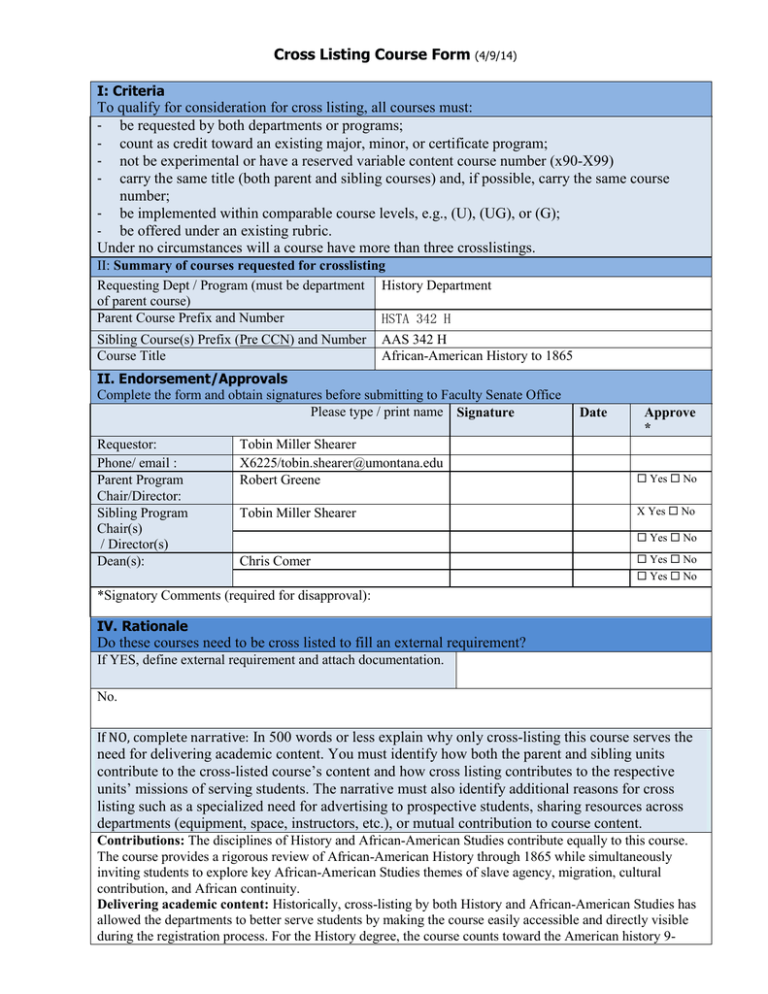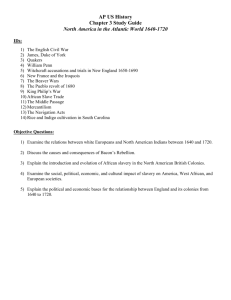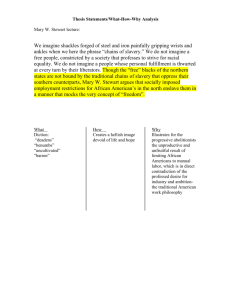Cross Listing Course Form
advertisement

Cross Listing Course Form (4/9/14) I: Criteria To qualify for consideration for cross listing, all courses must: - be requested by both departments or programs; - count as credit toward an existing major, minor, or certificate program; - not be experimental or have a reserved variable content course number (x90-X99) - carry the same title (both parent and sibling courses) and, if possible, carry the same course number; - be implemented within comparable course levels, e.g., (U), (UG), or (G); - be offered under an existing rubric. Under no circumstances will a course have more than three crosslistings. II: Summary of courses requested for crosslisting Requesting Dept / Program (must be department History Department of parent course) Parent Course Prefix and Number HSTA 342 H Sibling Course(s) Prefix (Pre CCN) and Number AAS 342 H Course Title African-American History to 1865 II. Endorsement/Approvals Complete the form and obtain signatures before submitting to Faculty Senate Office Please type / print name Signature Requestor: Phone/ email : Parent Program Chair/Director: Sibling Program Chair(s) / Director(s) Dean(s): Date Approve * Tobin Miller Shearer X6225/tobin.shearer@umontana.edu Robert Greene Yes No Tobin Miller Shearer X Yes No Yes No Chris Comer Yes No Yes No *Signatory Comments (required for disapproval): IV. Rationale Do these courses need to be cross listed to fill an external requirement? If YES, define external requirement and attach documentation. No. If NO, complete narrative: In 500 words or less explain why only cross-listing this course serves the need for delivering academic content. You must identify how both the parent and sibling units contribute to the cross-listed course’s content and how cross listing contributes to the respective units’ missions of serving students. The narrative must also identify additional reasons for cross listing such as a specialized need for advertising to prospective students, sharing resources across departments (equipment, space, instructors, etc.), or mutual contribution to course content. Contributions: The disciplines of History and African-American Studies contribute equally to this course. The course provides a rigorous review of African-American History through 1865 while simultaneously inviting students to explore key African-American Studies themes of slave agency, migration, cultural contribution, and African continuity. Delivering academic content: Historically, cross-listing by both History and African-American Studies has allowed the departments to better serve students by making the course easily accessible and directly visible during the registration process. For the History degree, the course counts toward the American history 9- credit requirement. For Af-Am, the course fulfills one of three core course requirements. Advertising to prospective students: At the University of Montana, African-American Studies faculty work proactively to recruit students to their classes by offering engaging pedagogy, high academic standards, and strong support for interested students. Cross-listing has been an essential component of the overall recruitment strategy. Specialized need: In short, at a majority-white institution, Af-Am faculty need every possible measure to keep the program viable and growing. Cross-listing provides a key advertising method to meet the specialized need of a minority program in a majority setting. Mutual contribution: Likewise, cross-listing of these two courses offers immediate recognition of the mutual contribution that both departments/programs make to the course. Students have offered consistent testimony that they would have never taken the course if they had not 1) first encountered it through History or 2) first discovered it through African-American Studies. This, as much as any other dynamic, gives strong evidence that the students themselves are requesting that the course be cross-listed in the future. Both departments place a strong value on delivering the widest possible curriculum offerings as students pursue their degrees. The cross-listing mechanism introduces students easily and directly to courses that they might not otherwise consider and demonstrates in the mechanism itself the high value that both departments place on each other’s respective disciplines – an instructional method in and of itself that sends the message that disciplines can and should be in constant conversation. V. Syllabus AAS/HIST 342H: AFRICAN AMERICAN HISTORY TO 1865 COURSE SYLLABUS Fall, 2014 COURSE INFORMATION a. b. c. d. e. Course Number: AAS/HIST 342H, Sec. 01A & 01B Course Request Number (CRN): 72600 & 71897 Room# and time: NAC (Native American Center) 105, 11:10-12:00, MWF Prerequisites: none Credits: 3 INSTRUCTOR INFORMATION a. Instructor: Dr. George R. Price b. Office Hours and Location: MWF, 10:15-10:45, 1:00-1:45, 3:30-5:00, no appointment necessary, or other days and times by appointment only, in NAC (Native American Center) 203E c. E-mail: george.price@mso.umt.edu d. Office Phone: 243-2302 REQUIRED TEXTS White, Deborah Gray, Mia Bay, and Waldo E. Martin Jr., Freedom on My Mind: A History of African Americans, with Documents, vol. 1, Boston and New York, Bedford/St. Martin’s, 2013 Wright, Donald R., African Americans in the Colonial Era: From African Origins through the American Revolution, Wheeling, Ill., Harlan Davidson, Inc., 2000. (referred to as “v1” in the lecture calendar) Wright, Donald R., African Americans in the Early Republic, 1789-1831, Wheeling, Ill., Harlan Davidson, Inc., 1993. (referred to as “v2” in the lecture calendar) A Frederick Douglass Reader, compiled excerpts from Frederick Douglass’ two most important autobiographies. Available FREE online on our course Moodle page (see below) and also a paper copy will be available for checkout at the Mansfield Library reserve desk. MOODLE WEBPAGE Some short articles will be added to our readings during the course of the semester, either as paper handouts given in class, or posted electronically on our Moodle webpage. Connect through your UM Online account. Important announcements, some articles (including some required readings), power point slides from the lectures, exam grades, web links and other information will be put on this page throughout the semester. There is also a discussion board where you can raise questions and get feedback from the instructor and your fellow students. It is recommended that students check the Moodle page at least once a day. COURSE DESCRIPTION This course is a survey of the diverse historical experiences of Americans of African descent in the United States, from their origins in Africa until the end of the Civil War. Our focus will be on the quest of enslaved African Americans for freedom and dignity and the quest of free African Americans for equal opportunity and inclusion in American society, as they struggled against racism and oppression. COURSE OBJECTIVES A. To familiarize students with the historical facts and circumstances that transformed diverse peoples of Africa into African Americans in the United States. B. To enable students to explore the reasons behind the formation of the institution of American slavery and racist concepts regarding humanity. C. To assist students in forming their own assessments and analyses regarding the logic, validity, and usefulness of popularly-held ideas about the nature of humanity. D. To help students to think independently and move beyond the limitations of customary popular concepts. E. To familiarize students with the facts concerning the history of African American resistance to slavery racism and other social injustices. F. To increase student awareness of the significant African-American influences upon, and contributions to, the development of American society. G. To provide a more complete context for understanding many of America’s current social problems. H. To familiarize students with some of the bibliographical and other sources of knowledge that are available for further study of the various topics that we will cover. I. To improve students’ research and writing skills. J. To provide students with opportunities for discussion and inquiry related to our topics. GRADING CRITERIA I use a precise, numerical, percentage point grading system. No letter grades are assigned until after the final exam and all of the points are added up. Student grades will be based on the combined scores of the writing assignments, in-class participation, the midterm exam, and the final exam. The grades will be weighted as follows: Grade Scale: 21% for the short essays 92-100 = A 72-77.5 = C 27% for the research paper 90-91.5 = A70-71.5 = C20% for the midterm exam 88-89.5 = B+ 68-69.5 = D+ 22% for the final exam 82-87.5 = B 62-67.5 = D 10% for attendance and participation 80-81.5 = B78-79.5 = C+ 60-61.5 = Dbelow 60 = F (The details for the writing assignment will be given separately from this syllabus.) Extra credit opportunity: Two extra points for making a five minute presentation to the class regarding your research and/or writing experiences related to our topics. Special arrangements for taking the exams at other than the designated times must be made in advance and approved by the instructor. Only very dire, unavoidable circumstances will be considered. DISABILITY MODIFICATIONS The University of Montana assures equal access to instruction through collaboration between students with disabilities, instructors, and Disability Services for Students. If you think you may have a disability adversely affecting your academic performance, and you have not already registered with Disability Services, please contact Disability Services in Lommasson Center 154 or call 406.243.2243. I will work with you and Disability Services to provide an appropriate modification. ATTENDANCE All students are individually responsible for acquiring information made available through lectures, reading assignments, and materials handed out in class. Attendance and participation make up 10% of your grade (see "Grading Criteria" section above). Verified excused absences will receive half-credit. Disrespectful behavior, such as talking to others during a lecture or while another student is addressing the class, or playing with electronic devices during class, will result in loss of attendance and participation credit for that day. The lectures will be recorded and available on iTunes U, accessible from the UM One Stop webpage. Therefore, on days when you don’t feel like sitting quietly and listening courteously to a lecture and/or participating in stimulating discussions, PLEASE, out of respect for everybody else, DON’T GO TO CLASS! ACADEMIC HONESTY Plagiarism is the misrepresentation of another person’s writing as one’s own. Plagiarism is a violation of the University of Montana Code of Student Conduct, and the professor can give a student who plagiarizes an assigned paper a failing grade for the course. The UM leaves it up to each professor to decide if such action is appropriate. I choose to give a failing grade (no credit) for the particular assignment that was plagiarized, and no opportunity to re-do the assignment. That could lead to a failing grade for the course, but not necessarily, depending on how the student does with the rest of the graded items for the course. We professors are aware that there are a growing number of internet websites that sell “research papers” to students who are susceptible to that kind of scam. But there are also several websites that we can use to detect such papers and find their point of origin. Using such internet aids (and by other means), I have caught several students over the years who turned in plagiarized works, and it is never a pleasant situation for either of us. Consider yourselves to be kindly forewarned. Exams will be monitored and students must work individually. Talking to other students during the exam, copying another student’s paper, or other forms of cheating, will result in an “F” grade for that exam. COURSE OUTLINE/ CLASS CALENDAR (may be subject to minor revisions, TBA) Date Lecture Topic Reading Assignments Aug. 25 Introduction to the course and the professor (* = optional reading) “ 27&29 The African origins of African Americans White, pp. 2-10; Wright, v1, pp.7-28 Sept. 1 LABOR DAY HOLIDAY- NO CLASS “ 3 Origins and reasons for the trans-Atlantic slave trade White, pp. 10-18; Wright, v1, Excerpts from documentary, “Wonders of the African World” pp. 28-41 “ 5 The “Middle Passage” and early experiences of Africans in America; discussion of study guide questions White, pp. 18-52; Wright, v1, pp.41-54 “ 8 previous lecture, continued " 10&12 Slavery, indentured servitude, and freedom in Colonial America White, pp. 54-89; Excerpt from documentary, “Slavery and the Making of America” Wright, v1, pp.55-96 " 15&17 The transformation of Africans into African Americans: Wright, v1, pp.100-157 African American cultural development during the Colonial era White, pp.110-120 COURSE OUTLINE/ CLASS CALENDAR, continued Lecture Topic Reading Assignment African Americans and Native Americans in the Colonial era; Influence of the Great Awakening and the Enlightenment on anti-slavery “ 22 Previous lecture, continued; African Americans and the American Revolution White, pp. 120-157; Wright, v1, pp.158-174; *articles posted on Moodle “ 24 Hopes and Betrayal: The U.S. Constitution and institutional racism Case study: James Easton “ 26 Reasons for the expansion of slavery and racism in the White, pp.160-220; early American republic Wright, v1,pp.174-202, v2, 12-36 “ 29&Oct.1 The growth of free African American communities and organized resistance to slavery and racism in the early19th century Wright, v2, Origins and reasons for African American church denominations pp.125-161 The life of Captain Paul Cuffe; discussion Oct. 3 African American community and cultural development White, 232-261 under slavery; scenes from “Roots” depicting slave Wright, v2, pp.43-84 community life “ 6&8 Video documentary: “When the Lion Wrote History,” Part 1 Frederick Douglass, experiences under slavery, Douglass, Narrative, pp. 39-47, and insights gained; Conditions under slavery and the impact 57-63, and 75-79 on families; psychological impact of slavery Douglass, My Bondage.., pp. 192-193 “ 10 previous lecture continued, discussion Forms of slave resistance to slavery Wright, v2, pp.85-124 First essay due Review outline for midterm exam distributed “ 13 The Uplift Movement; Free African American human rights activism in the 1820s and ‘30s; The early African American press White, 215-232, 264-285 “ 15 previous lecture, continued; discussion of study guide questions, and review for Midterm exam “ 17 Midterm exam “ 20&22 brief excerpt from documentary: “Slavery and the Making of America” David Walker, Maria Stewart, & Hosea Easton (sample writings of all three of these activists are posted on our Moodle page and are required reading) “ 24&27 The abolitionism movement, or, “The American Revolution, Part 2,” White, 309-317 “ and the violent opposition to freedom and equality in the 1830s Wright, v2, 162-208 Discussion: Do you see any parallels to the 1830s in today’s U.S.A? “ 29&31 Frederick Douglass, life as a free man and Douglass, My Bondage.., 198-243 an abolitionist 247-279, 289-298 Documentary: “Frederick Douglass: When the Lion Wrote History,” Pt. 2 Discussion of Douglass’ writings and the video Nov. 3&5 African Americans, abolitionism and politics in the 1840s; voting rights, “The Slave Power Aristocracy”; the Free Soil Party; discussion “ 7 The impact of pro-slavery forces on American politics and society please read: Slavery and Political Power in the U.S., 1790-1865 (document on Moodle) “ 10 African Americans on the early western frontiers and in the California Gold Rush Last essay (2nd or 3rd) due readings to be posted or handed out Date “ 19 Submit research paper topics to the professor for approval and/or suggestions (if you have not yet already done so) “ 12-14 The Underground Railroad, The Fugitive Slave Law of 1850, White, pp. 285-308 and the U.S. attack on free African Americans in the 1850’s Still, preface to The Increasing violent disputes over slavery in the 1850s Underground Railroad (both editions) COURSE OUTLINE/ CLASS CALENDAR, continued Date Lecture Topic Reading Assignment Nov. 17&19 “Bleeding Kansas” and John Brown; The Dred Scott decision and its implications for America *Moodle links on the Dred Scott case “ 21 John Brown and Harper’s Ferry lecture and video Thoreau, Plea for Capt. J.B. Turn in rough draft or (at least) a detailed outline for your research paper “ 24 Abraham Lincoln, American political changes White, pp. 322-361 after Dred Scott “ 26-28 THANKSGIVING VACATION- NO CLASSES Dec. 1&3 Abraham Lincoln, Frederick Douglass and African Americans in the Civil War article on Lincoln (see Moodle) Student extra credit presentations can be made any day this weekinform Professor Price in advance if and when you want to present. “ 3 Review outlines for final exam distributed and/or posted on Moodle “ 5 Did the Civil War end slavery? Impact of the Civil War and the 13th Amendment on African Americans; Last student presentations, closing discussion, Review for Final (Q and A); Course evaluations “ 5 Last day to turn in late essays or research paper (no papers will be accepted during Finals Week) " 12 Final Exam, Friday, December 12th, 8:00 to 10:00 a.m. If you know in advance that you will not be able to take the exam at this time, please make arrangements with the professor in advance to take the exam at another time during Finals Week. UM policy is that final exams can only be taken during Finals Week. VI. Justification for third crosslisting: In 500 words or less describe the extenuating circumstances making a third course necessary. VII Copies and Electronic Submission. After approval, submit signed original, and electronic file to the Faculty Senate Office, UH 221, camie.foos@mso.umt.edu.



